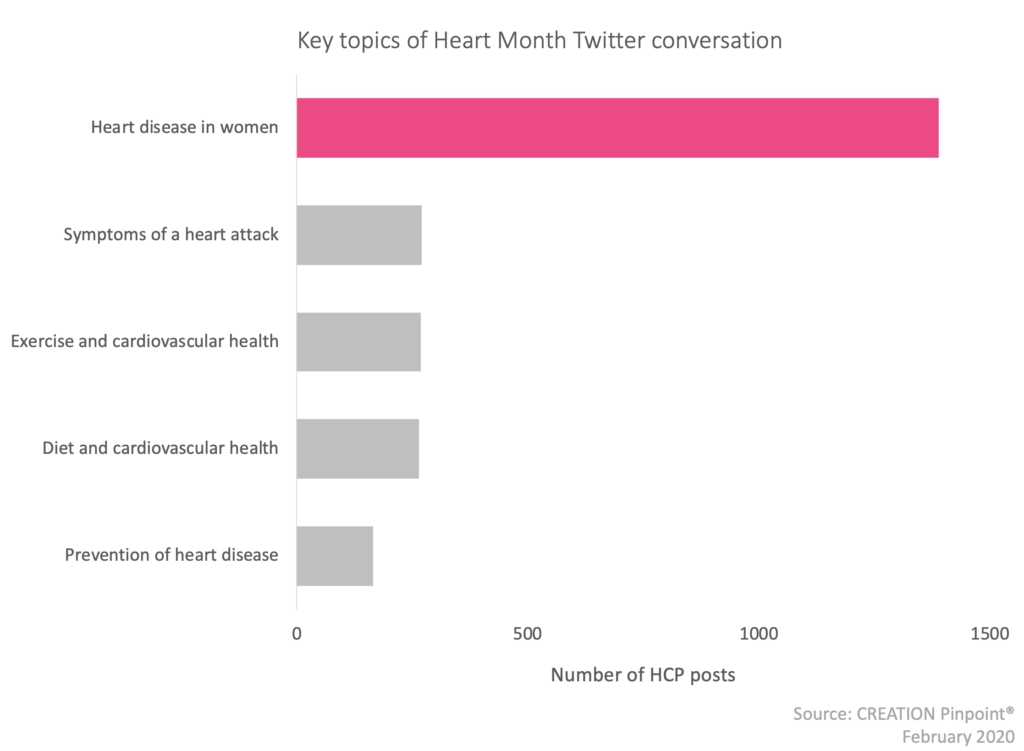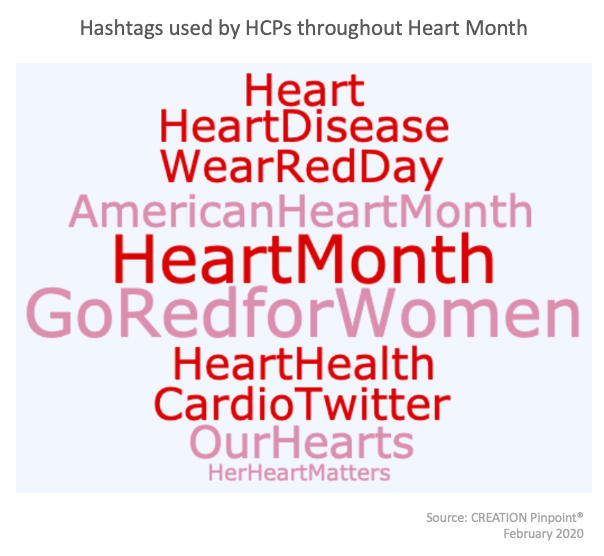According to the World Health Organisation (WHO), cardiovascular diseases are the number one cause of death globally, taking an estimated 17.9 million lives each year. Originally established by President Lyndon B. Johnson in 1963, American Heart Month is intended to raise awareness about heart health and urge those around you to prevent heart disease. This awareness campaign has now been adopted by many countries around the world, with February being internationally recognised and referred to simply as ‘Heart Month’. And thanks to the powerfully connected world of social media, awareness campaigns such as Heart Month can reach more of the population than ever before.
But are awareness campaigns like this for patients only, or can healthcare professionals (HCPs) engage with and benefit from these too? Using CREATION Pinpoint® technology to analyse the unprompted conversations of HCPs globally discussing Heart Month on Twitter, we saw that HCPs in the United States in particular were actively engaging with this campaign, making up approximately two thirds of HCP authors.

#GoRedforWomen
Much HCP discussion during Heart Month was centred around heart disease in women, which is underdiagnosed, undertreated and under-researched compared to in men. Many HCPs supported public campaigns such as American Heart Association’s (AHA) ‘Go Red for Women’, which saw Twitter authors wearing red clothing, or adding a red ‘Twibbon’ to their profile in support of the commitment to end heart disease in women.
Happy Friday y’all!
Wearing my red tie at work to support #GoRedForWomen ❤️
I am so fortunate to know some amazing women at work and on #cardiotwitter@GoRedForWomen ❤️#wearred ❤️ #heartmonth ❤️#hearthealth ❤️ #LoveYourHeart ❤️#HeForShe ❤️#FridaysNeverBoring ❤️ pic.twitter.com/sE85B2qcim— Raj Janardhanan, MD, MRCP, FACC, FASE (@rajdoc2005) February 7, 2020
In fact, apart from the simple hashtag #HeartMonth, the most used hashtag in HCP posts was #GoRedforWomen.

Striving to end preventable deaths
During Heart Month, HCPs publicly recognised various historic developments in cardiology which have contributed to significant improvements in the treatment of heart disease. However, the message was clear – prevention is the best treatment and there still remains a lot to be done to avoid preventable deaths.
Every year, cardiovascular disease kills more than half a million Americans, but many of these deaths are preventable. From @cnnhealth, @DrTomFrieden tells us how: https://t.co/7n8MFwLdWj #HeartMonth
— American Heart Association (@American_Heart) February 22, 2020
HCPs urged people to inform themselves of the risk factors for heart disease, and then take simple measures to keep themselves healthy and reduce their own risk. Some of the key ways HCPs suggested to lower the risk of heart disease included making dietary changes, exercising more and receiving recommended vaccinations.
Who was the most influential?
One author who was notably influential within the Heart Month online conversation amongst HCPs was US cardiologist Martha Gulati (@DrMarthaGulati). She was well respected by her HCP peers within the Heart Month conversation, who frequently retweeted her posts and mentioned her name within discussions. Many HCPs including Dr Gulati raised awareness of the symptoms of heart failure in women, and how these differ to the common male
THE @hvanspall presenting on #sexdifferences in Heart Failure
♥️different risk factors and. Different impact of RF in 💃🏻
♥️different forms of HF in 💃🏻
♥️difference in prognosis#HeartintheDesert #HeartMonth #sisterfromanothermother so grateful to have you here @rajdoc2005 pic.twitter.com/QOoNKn3Ssk— Dr. Martha Gulati ♥️🫀❤️🩹🇨🇦 (@DrMarthaGulati) February 1, 2020
Pharma companies contribute with above-brand messaging
Awareness days also offer a great opportunity for pharma companies to demonstrate interests aligned with the cares of HCPs and patients in the therapy area. Boehringer Ingelheim (@boehringerus) received positive engagement from members of the public who retweeted their post encouraging patients to speak with their doctor about managing their whole health, including diabetes and kidney disease.
Among adults with #heartfailure 40 percent have chronic kidney disease and between 20 and 40 percent have diabetes.
This #HeartMonth, talk to your doctor about how to manage your whole health to address these interconnected conditions. pic.twitter.com/dN4LooxmBb— Boehringer Ingelheim (@boehringerus) February 20, 2020
By engaging with the wider disease area, outside of brand messaging, pharma companies are more likely to be seen by HCPs as having a genuine motivation to improve patient care. For example, during Heart Month, Johnson & Johnson (@JNJNursing) authored a post celebrating influential nurse Elizabeth Mikula and her transformational work in cardiology, which was shared by eight US nurses.
This #AmericanHeartMonth, learn more about #nurse innovator Elizabeth Mikula, who worked to create and implement a screening toolkit that helps identify congenital #heart defects in newborns before they leave the hospital. ♥️ https://t.co/pRopHbmX9t
— Johnson & Johnson Nursing (@JNJNursing) February 13, 2020
Throughout February, we have seen HCPs engaging with Heart Month by raising awareness, encouraging the prevention of heart disease, and standing in solidarity with patients. HCPs across the globe added a valuable voice to the Heart Month discussion on Twitter, and alongside patients, professional organisations and pharma companies, demonstrated their caring attitude towards the therapy area, engaging with campaigns striving for tangible change.
 By Laura Marsh
By Laura Marsh 


